How Can We Help?
5.4.15.4.1
We are pleased to announce that version 5.4.1 (4.23.1) of Pure is now released.
Always read through the release notes before installing or upgrading to a new version of Pure.
Pay attention to the Upgrade Notes - failing to adhere to these may result in loss of functionality.
Released date: 06 November 2015
Installation and downloading
See the Request Pure distribution file page for information about how to request a new version of Pure.
Other Resources and Links
If you have problems with this release please contact Pure Support to get help.
Pure hosting requirements
See the Pure Requirements page for more information about the current hosting requirements for Pure.
Administration module
1. Open Access improvements and unification
Affected Bases: All
Roles affected: All roles with the ability to create / edit / report on Research Output content
Feature purpose: Improvements to Open Access functionality stemming from customer feedback to 5.3.0 / 4.22.0 (see 5.3.0 / 4.22.0 Release notes)
Feature description:
- The layout and text of the Research Output editor has been improved to help users upload electronic (full-text) versions, and related files and links, appropriately
- Both the Research Output editor and the Standard Portal have been updated to display the Open Access Status of individual electronic (full-text) versions
- The logic for the Open Access Status has been updated to fully capture the implications of the record Visibility (i.e. Public / Campus / Backend / Confidential), and whether a DOI or Link electronic version has been added (as the OA Status of outputs accessible via external DOIs or Links is not impacted by the visibility of the Pure record) - NOTE that this was not resolved until the 5.5.2 / 4.24.2 release
- The ‘Document version’ classification scheme is now locked and has been standardised to ensure consistency with RIOXX2.0 / NISO terminology (PLEASE NOTE the migration rules described below):
- Not set
- Submitted manuscript (early version, also known as pre-print)
- Accepted author manuscript (peer reviewed version)
- Final published version (Publisher’s PDF, also known as Version of record)
- Other version
- When adding a DOI, the Document version now defaults to ‘Final published version’
- Validation has been introduced that requires the Embargo end date to be equal to or after the Embargo start date
Screenshots:
 |
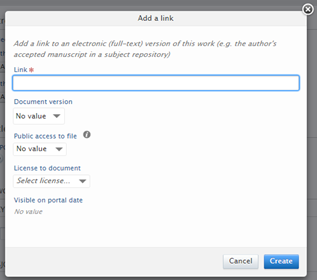 |
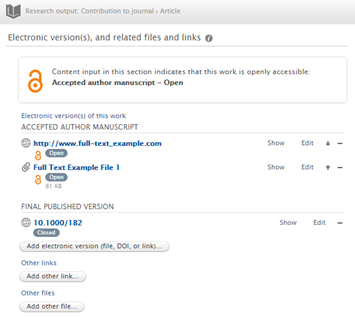 |
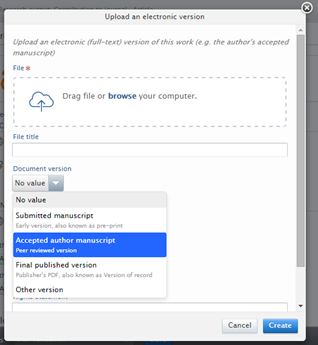 |
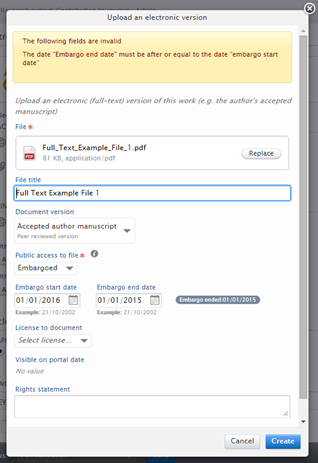 |
Notes:
- Some Advanced Portals (those that use the same Research Output render as the Standard Portal) will be automatically updated with the display of the Open Access Status of individual electronic (full-text) versions. Those customers whose Portal is not updated automatically will need to make a separate change request.
- Updated description of the logic behind deriving the Open Access status of the record is available here
- The migration rules implemented for the new 'Document version' classification scheme are available here
Country specific functionality
2. UK : REF2020 Module
Affected Bases: UK
Roles affected: All roles with the ability to create / edit / report on Research Output content
Feature purpose: To enable institutions to undertake preparatory exercises for the next REF (REF2020 is used here for ease), a blank copy of the REF2014 module was made available in 5.3.0. In the first instance, this was simply a copy of the REF2014 module, with census period / date changes. In 5.4.0 we focussed development on the REF Open Access requirements and enabling institutions to monitor compliance with the new policy; this included determining and capturing the REF Open Access compliance status on relevant outputs, and enabling associated reporting. In 5.4.1, we have made a small enhancement to help ensure users input the full Acceptance date.
Please note that this release does not include the planned REF OA monitoring screens, as at the time of release, testing continued to reveal data accuracy issues. Our expectation is to include these screens in the 5.4.2 release.
Feature description:
- Where the REF2020 module is enabled, when inputting an Acceptance date, the user is now advised that the full Acceptance date is required in order to determine the output’s REF eligibility
- Applicable only to:
- Contribution to journal
- Contribution to specialist publication
- Chapter in Book / Report / Conference proceeding > Conference contribution
- The date quoted is as per the ‘REF2020 OA compliance start date’ configuration
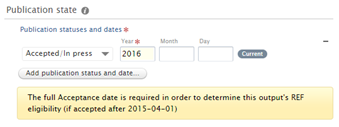
- Applicable only to:
Further information:
Further documentation is available in the REF2020 wiki
Published at November 30, 2023
